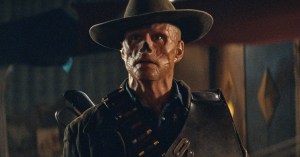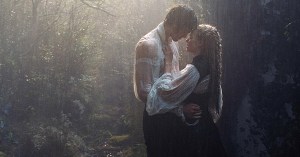Chevalier’s Kelvin Harrison Jr. on Breathing Life into a Forgotten “Prince” of Marie Antoinette’s Royal Court
Harrison reveals how hard he fought for the role, what kind of preparation was needed, and how he processed the lingering prejudices of the era.
Since his feature film debut in Steve McQueen’s Best Picture-winning 12 Years a Slave. Kelvin Harrison Jr. has amassed an incredible filmography of award-winning performances with visionary filmmakers and alongside Oscar-winning actors. No stranger to being the first name on the call sheet despite his young age, Harrison has starred in several Oscar-nominated features, including three Best Picture nominees (The Trial of the Chicago 7, Elvis, 12 Years a Slave). Coming off his noteworthy performance playing Blues legend BB King in Elvis, it would seem his current role as the Chevalier Bourgogne is not just a role he was destined to play, but one that he’s been preparing and fighting for his entire career. A former conservatory student and musician in his own right, the New Orleans native stars in the biographical drama Chevalier, directed by Stephen Williams and written by Stefani Robinson of Atlanta fame.
This is the first big-screen adaptation to focus on the French Caribbean musician Joseph Bologne, Chevalier de Saint-Georges, a true Renaissance man whose incredible journey from the Caribbean to Parisian aristocracy is, in many ways, stranger than fiction. Born to an enslaved woman and a titled member of the bourgeoisie, Bologne was a musical prodigy, a world-renowned fencer, and no stranger to a duel. Educated with the aristocracy but of mixed race, he was oftentimes at odds with the status quo. He was centuries ahead of the social-political curve, though in truth he was the early embodiment of an adage long held by those of the the colonial African diaspora: he had to be twice as good to get half as much.
The new Certified Fresh feature about his life, which premiered at the Toronto International Film Festival last year, also stars Minnie Driver, Lucy Boynton, and Samara Weaving as a trio of women who shaped his formative years. Set for wider release this weekend, we recently sat down with Harrison and chatted about Chevalier, the incredible story of his life, the daunting preparation, and how the musician Prince was the blueprint for a man who transcended his meager beginnings on a Caribbean plantation to join the court of Louis XVI.
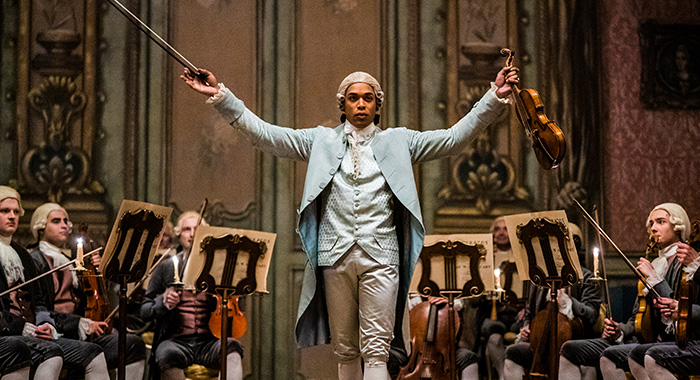
(Photo by Larry Horricks/©Searchlight Pictures)
Jacqueline Coley for Rotten Tomatoes: When we last spoke, you mentioned that this film was on the horizon, so talk about the journey to get here, because it has been a while since it was announced.
Kelvin Harrison Jr: It started in 2019. I did the general meeting with Searchlight Pictures, met with some of the creative members there, and said, “Hey, I want to work with you guys. What do you got on your slate?” They listed a few projects; one of them was Chevalier. I said, “That sounds like something I’m interested in.” And they said, “Okay, we’ll consider.”
And then I heard nothing for a year, and then finally, I got the script. I asked if I could audition. They said, “Not yet.” And then next thing you know, six months later, I finally get a meeting with Stephen [Williams]. I said, “Can I have the job?” He said, “No.” He said to send a tape. I said, “Fine.” I sent in a tape.
I said, “Can I have the job now?” He said, “No, I need you for a callback.” I did the callback.
I said, “Can I have the job?” He said, “Let me de deliberate with some other people.” I said, “Fine.”
I wrote a letter. I said, “Stephen, I’m not playing with you. I want the job.”
RT: Wow. That is a lot, and intriguing since you fought so hard to do this daunting task of preparation. There was horse riding, fencing, and musicianship, which I know was not foreign to you. And then on top of that, the period piece of it all, the swagger of it all, trying to be contemporary to the time. What was the most challenging part?
Harrison: Not surprisingly, it was the violin playing. That was the hardest part, simply because it’s learning a whole separate script, and you have to prep it like you would prep the script because it’s a language. And yes, you have to get the technical aspects of it, but once you finally get the technical side of it, you have to figure out, “What am I saying in this song? What is Joseph?” He’s not just a violinist playing other people’s music, he’s a composer. He wrote these tracks. So then there’s getting the mindset of Joseph and [composer] Michael Abels, because he was also now my collaborator, as we are both Joseph in this moment. It’s a lot of little intricate little pieces to make it come to life, but that became my biggest homework, and then finding the time to do my acting work, fencing work, and everything else that came around with it.
RT: I’m glad you mentioned Michael Abels. He did Get Out and so many other incredible films, but obviously, this level of composition, this time period, this was the heyday. This was back when Beethoven was bigger than the Beatles. Was it hard to show the swagger of classical music? He was not just, “I’m Joseph Bologne.” He has to be Chevalier. So how do you encapsulate the time period because of all the other things he had to deal with? He was even more defiant.

(Photo by Larry Horricks/©Searchlight Pictures)
Harrison: Yes, yes, defiant is the word. Yes, and that is the word even Stephen Williams used. We used to really drill in for Joseph. It’s just when you read about him in the snippets that you start to hear about this flamboyance, this borderline arrogance, this way… him being a man about town. Everyone loves him, but everyone is a little scared of him. Everyone has something a little shady to say about him, and you go, “Well, who is saying these things?” People that were jealous. It was people that either wanted to sleep with him or wanted to play with him, to compete with him, or lost to him in a bout. Do you know what I mean? And so he’s just looking at a bunch of haters, who are like, “Well, who is this guy?”
And Stephen was so great. He was like, “You know who he reminds me of?” And I was like, “Don’t say it. I know it.” And we were both like, “Prince.” He was the Prince of the moment. We leaned into that all the way down to the Purple Coat we see in the poster, and really just wanted to play with this idea of this being his Purple Rain moment in some ways. It is this guy who has this way about him that’s like, you know you want it, and you should want it because it’s the best thing here.
RT: The one thing I will say about that timeframe is, obviously, it’s hard to say who won and who lost, but despite all his trials and tribulations, this is a hero’s journey. It’s not the typical biopic; typically it’s obviously tragic. Maybe this is why it is not as well known of a story — it was too celebratory. Is that something that maybe struck you about it? Is this guy actually having a fairly good life, and we don’t know it? Did that surprise you?
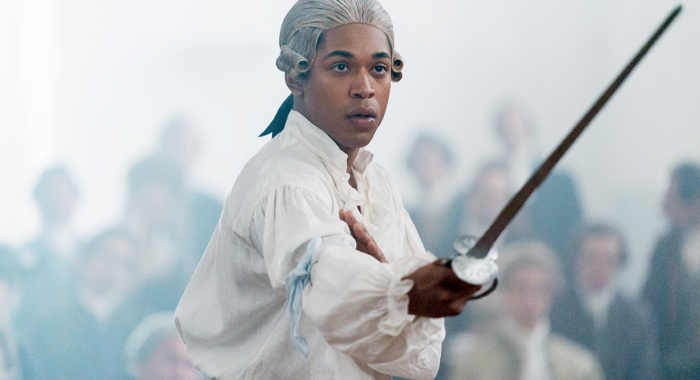
(Photo by Larry Horricks/©Searchlight Pictures)
Harrison: Yeah, but at the same time, it didn’t surprise me. When I started looking at the research and doing the history work of France at the time, you started looking at these characters, and I was like, of course these guys wanted to erase him from history. Of course they didn’t want to allow him the space to thrive, because he’d be too powerful. He managed to go from a plantation to being knighted as the Chevalier and being close companions with the Queen. It’s terrifying if you think about that. And then he not only is swift and can beat the best fencer, the best guardsmen technically, Picard at the time, but then your favorite entertainer of the year, he’s polishing the floor with them. You put him on the cover of Time Magazine at this point. Name him, he’s the President. He’s the king of France.
RT: The women in this piece are three very important women in his life, but that trifecta is so interesting when you think about the man.
Harrison: One hundred percent. And what I find fascinating about those relationships is each one in the movie deals with the patriarchy and misogyny, and obviously, someone feeling a little bit of an immigrant. With Marie Antoinette, she comes into a space that’s definitely not hers, them really not accepting her as a little girl. And even Minnie, we’re dealing with ageism, someone being the prime diva of a time and then being like, “You’re out, she’s in.”
It’s so many different elements of people feeling like everything is so transactional. Everything is so much, “What do you have to offer us at this time to keep us distracted from the accountability that we don’t want to face with the people?” And that’s what makes this movie contemporary as well, because here we are. But these women are powerful, and they do understand Joseph, but the interesting thing about it is that they’ll turn on him in a second because he’s not of them.
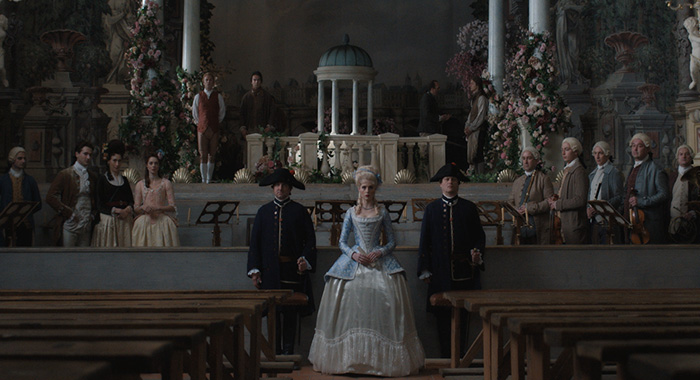
(Photo by Larry Horricks/©Searchlight Pictures)
RT: In the end, it’s even there in the title of the film and the sentiment of it, because despite anybody that propped him up for his talent, his being a warrior or being a scholar, in the end, it was just him because of his race. Ultimately, he was the only person he could rely on. The same could be said for you in this performance. So who were your biggest guides?
Harrison: Yes. I think the music. I started with the music and my dad. When I got it, he was very excited as a musician and a classical music teacher, but he also said, “Kel, let’s just start talking about it. Let’s start talking about what you’re listening to and what you’re hearing. Where’s the storytelling in it?” And as I was making the history and listening to the music, you started to find ways into it. You can almost hear the sounds of the ship and what that experience was like for him, leaving at four years old and landing in Paris. You can feel it. He finds ways to write sounds that feel like being someone who doesn’t understand what the other kids are saying and that not being your native tongue, but having to adapt, being made fun of, the loneliness he has experienced. You can hear it in his violin, you can hear it in some of his opuses. And that work really made it feel like a diary. It was like, “Dear diary: Today, I don’t know what’s going on, but I’m going to prevail.” I used that, as these were the diary entries that I couldn’t get from the history books.
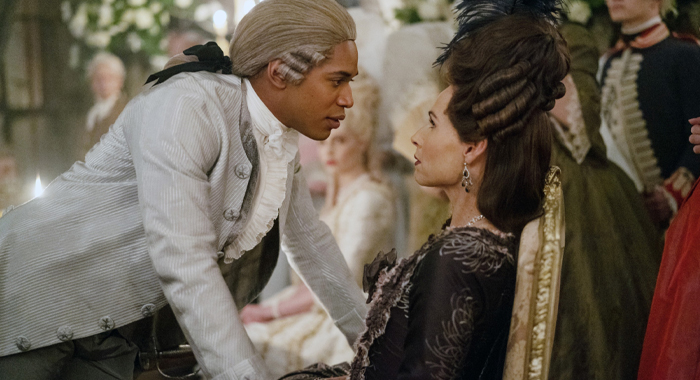
(Photo by Larry Horricks/©Searchlight Pictures)
Harrison: Telling Minnie Driver off was pretty great. I was ready. I was ready. [laughs] I couldn’t wait for that day. So that was my favorite day.
But there’s some other stuff. Without giving any spoilers, there’s a moment where Joseph finds out he’s lost something. And that, I was really anxious about, and we had a drama therapist on set, so it was so wonderful, because she was specifically for the characters. So I got to talk to her as Joseph and work with Joseph’s problems, because we talked about how much you’re undergoing as a Black actor in this space, recreating some of these really tragic moments and some of the hatred and some of the racism.
There were times when we would shoot in places in Prague where it was the original cathedral where Mozart premiered Don Giovanni, but the history’s still on the walls. There’s a blackface Othello in the hallway, so you’re embracing many of those things energetically and spiritually. So it was nice to be able to unpack it, but that particular scene… Yeah, there are a lot of beautiful moments in the movie, but that was definitely a particularly tough one.
RT: Before we go, we don’t want anyone lost on what type of film this is. This is not a standard biopic. It feels more like Hamilton.
Harrison: For sure. It is fun. [laughs] It is entertainment above all. Listen, all I want the audience to know is what I was pulling from. I was looking up “Prince giving petty looks” videos and compilations on YouTube. At the end of the day, side eye on everyone. You get a side eye, you get a side eye, and you certainly get a side eye. Do you know what I mean? That’s how Joseph was moving through this town, and it’s funny. It is very funny.
Chevalier is currently in select theaters and will expand into more theaters this week.
On an Apple device? Follow Rotten Tomatoes on Apple News.
Thumbnail image Courtesy of Searchlight Pictures



